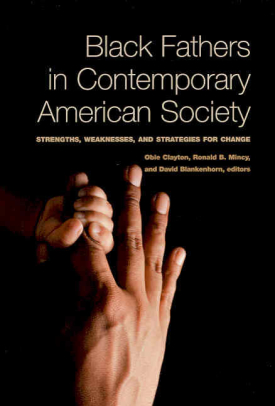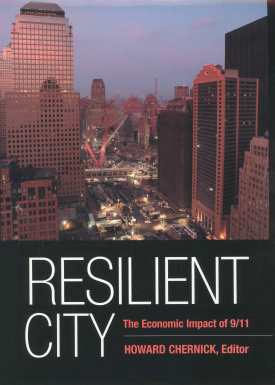
Black Fathers in Contemporary American Society
About This Book
The majority of African American children live in homes without their fathers, but the proportion of African American children living in intact, two-parent families has risen significantly since 1995. Black Fathers in Contemporary American Society looks at father absence from two sides, offering an in-depth analysis of how the absence of African American fathers affects their children, their relationships, and society as a whole, while countering the notion that father absence and family fragmentation within the African American community is inevitable.
Editors Obie Clayton, Ronald B. Mincy, and David Blankenhorn lead a diverse group of contributors encompassing a range of disciplines and ideological perspectives who all agree that father absence among black families is one of the most pressing social problems today. In part I, the contributors offer possible explanations for the decline in marriage among African American families. William Julius Wilson believes that many men who live in the inner city no longer consider marriage an option because their limited economic prospects do not enable them to provide for a family. Part II considers marriage from an economic perspective, emphasizing that it is in part a wealth-producing institution. Maggie Gallagher points out that married people earn, invest, and save more than single people, and that when marriage rates are low in a community, it is the children who suffer most. In part III, the contributors discuss policies to reduce absentee fatherhood. Wornie Reed demonstrates how public health interventions, such as personal development workshops and work-related skill-building services, can be used to address the causes of fatherlessness. Wade Horn illustrates the positive results achieved by fatherhood programs, especially when held early in a man's life. In the last chapter, Enola Aird notes that from 1995 to 2000, the proportion of African American children living in two-parent, married couple homes rose from 34.8 to 38.9 percent; a significant increase indicating the possible reversal of the long-term shift toward black family fragmentation.
Black Fathers in Contemporary American Society provides an in-depth look at a problem affecting millions of children while offering proof that the trend of father absence is not irrevocable.
OBIE CLAYTON is professor and chair of the Sociology Department at Morehouse College and executive director of the Morehouse Research Institute.
RONALD B. MINCY is the Maurice V. Russell Professor of Social Policy and Social Work Practice at the School of Social Work, Columbia University.
DAVID BLANKENHORN is president of the Institute for American Values.
CONTRIBUTORS: Enola G. Aird, David Blankenhorn, Lawrence D. Bobo, Obie Clayton, Maggie Gallagher, Wade F. Horn, Ronald B. Mincy, Joan W. Moore, Barbara Morrison-Rodriguez, Steven L. Nock, Hillard Pouncy, Wornie L. Reed, and William Julius Wilson.
RSF Journal
View Book Series
Sign Up For Our Mailing List
Apply For Funding

Resilient City
About This Book
The strike against the World Trade Center on September 11, 2001, was a violent blow against the United States and a symbolic attack on capitalism and commerce. It shut down one of the world’s busiest commercial centers for weeks, destroyed or damaged billions of dollars worth of property, and forced many New York City employers to slash their payrolls or move jobs to other areas. The immediate economic effect was substantial, but how badly did 9/11 affect New York City’s economy in the longer term? In Resilient City, Howard Chernick and a team of economic experts examine the city’s economic recovery in the three years following the destruction of the Twin Towers.
Assessing multiple facets of the New York City economy in the years after 9/11, Resilient City discerns many hopeful signs among persistent troubles. Analysis by economist Sanders Korenman indicates that the value of New York–based companies did not fall relative to other firms, indicating that investors still believe that there are business advantages to operating in New York despite higher rates of terrorism insurance and concerns about future attacks. Cordelia Reimers separates the economic effect of 9/11 from the effects of the 2001 recession by comparing employment and wage trends for disadvantaged workers in New York with those in five major U.S. cities. She finds that New Yorkers fared at least as well as people in other cities, suggesting that the decline in earnings and employment for low-income New York workers in 2002 was due more to the recession than to the effects of 9/11. Still, troubles remain for New York City. Howard Chernick considers the substantial fiscal implications of the terrorist attacks on New York City, estimating that the attack cost the city about $3 billion in the first two years alone; a sum that the city now must make up through large tax increases, spending cuts, and substantial additional borrowing, which will inevitably be a burden on future budgets.
The terrorist attacks of September 11 dealt a severe blow to the economy of New York City, but it was far from a knock-out punch. Resilient City shows that New York’s dynamic, flexible economy has absorbed the hardships inflicted by the attacks, and provides a thorough, authoritative assessment of what, so far, has been a strong recovery.
HOWARD CHERNICK is professor of economics at Hunter College of the City University of New York.
CONTRIBUTORS: Joshua Chang, Oliver D. Cooke, Franz Fuerst, Andrew F. Haughwout, Edward W. Hill, Sanders Korenman, Iryna Lendel, James A. Parrott, Cordelia W. Reimers, Jonathan A. Schwabish.
A September 11 Initiative Volume
